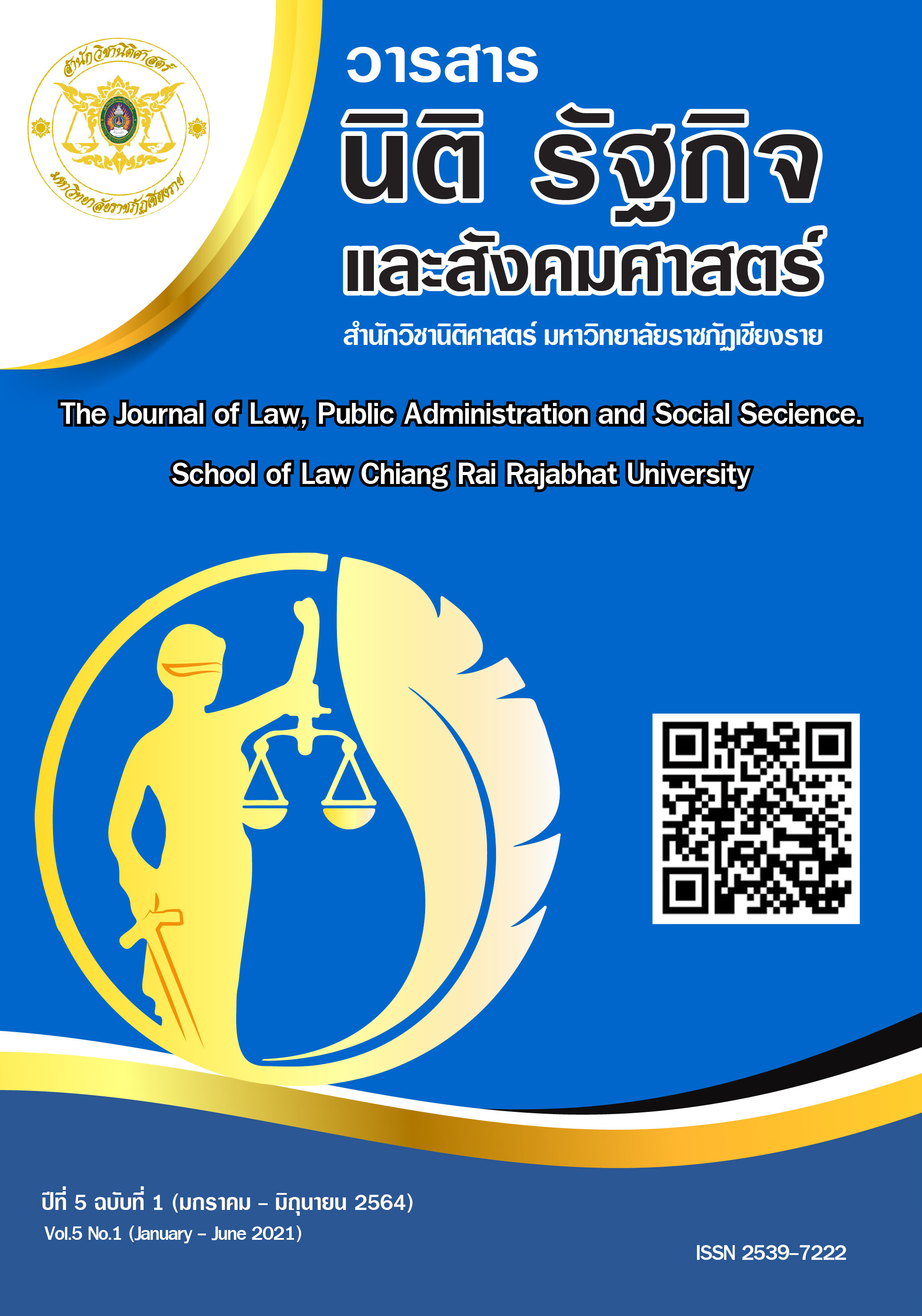The Rule of Law and Trial in Absentia of Thai Law
Main Article Content
Abstract
A criminal trial without the defendant’s presence (trial in absentia) may violate the rule of law related to the rights of the defendant to fully to defend, especially the right of a defendant in a criminal case to be present for the examination of witnesses.
The purpose of the rule of law is to guarantee basic fundamental rights to freedom through due process of law and other rights of defendants. A trial in absentia is an exception to the right of a defendant to be present at his or her own trial. This right to be present at trial is part of the fair-trial rights that are universally-recognized under the International Covenant on Civil and Political Rights (ICCPR) and the European Court of Human Rights (ECHR). A trial in absentia is only justified when a state provides appropriate guarantees of protections of the defendant’s rights.
This study examined trial in absentia under Thai law, including the Organic Act on Criminal Proceeding against Persons Holding Political Positions (B.E. 2560), the Corruption and Misconduct Procedures Act (B.E. 2559), and the Human Trafficking Criminal Procedure Act (B.E. 2559).
This study found that none of these laws include guarantees of protections of the rights of the defendant to defend appropriately. This might be a violation of the rule of law related to the rights of the defendant to defend appropriately under the ICCPR.
Article Details
References
กำชัย จงจักรพันธ์. “หลักนิติธรรม ความหมาย สาระสำคัญ และผลของการฝ่าฝืน.” http://www.lrct.go.th/th/?p=5716. สืบค้นเมื่อ 1 สิงหาคม 2563.
กู้เกียรติ เมืองสง. การพิจารณาคดีลับหลังจำเลย. วิทยานิพนธ์นิติศาสตรมหาบัณฑิต. กรุงเทพ: จุฬาลงกรณ์มหาวิทยาลัย, 2550.
กรพจน์ อัศวินวิจิตร. “หลักนิติธรรมกับการบริการสาธารณะของรัฐ.” วารสารศาลรัฐธรรมนูญ 19, ฉ.55, (2560).
คณะอนุกรรมการวิชาการและคณะอนุกรรมการบรรณาธิการในคณะกรรมการว่าด้วยการส่งเสริมหลักนิติธรรมแห่งชาติ 2558. หลักนิติธรรม (The Rule of Law) ความหมายสาระสำคัญและผลของการฝ่าฝืนหลักนิติธรรม. กรุงเทพฯ: บริษัทพีเอสพริ้นติ้งดีไซน์ จำกัด.
จักรพงศ์ ลิ้มสุวรรณ. ความเป็นนิติรัฐและนิติธรรมในประเทศไทย. ในรวมบทความวิชาการคณะนิติศาสตร์ มหาวิทยาลัยราชภัฏมหาสารคาม. มหาสารคาม: มหาวิทยาลัยราชภัฏมหาสารคาม, 2557.
ชัยวัฒน์ วงศ์วัฒนศานต์. หลักนิติธรรม (Rule of Law). ในรวมบทความทางบทความทางวิชาการเนื่องในโอกาสครบรอบ 90 ปีศาสตราจารย์สัญญา ธรรมศักดิ์. กรุงเทพฯ: มหาวิทยาลัยธรรมศาสตร์, 2557.
ธานินทร์ กรัยวิเชียร. “หลักนิติธรรม (Rule of Law)” วารสารยุติธรรมคู่ขนาน. ปีที่ 2557.
ภัทรศักดิ์ วรรณแสง. ผู้พิพากษาศาลฎีกาและสมาชิกสภานิติบัญญัติแห่งชาติ. สัมภาษณ์ 2561. http://www.dsdw2016.dsdw.go.th/doc_pr/ndc_2560-2561/PDF/. สืบค้นเมื่อ 10 กันยายน 2563.
ดิศรณ์ ลิขิตวิทยาวุฒิ. การพิจารณาคดีอาญาโดยไม่ปรากฏตัวจำเลย: ศึกษากรณีการดำเนินคดีอาญาของผู้ดำรงตำแหน่งทางการเมือง. วารสารนิติศาสตร์ มหาวิทยาลัยธรรมศาสตร์ 47, ฉ.4, 2561.
เผ่าพันธุ์ ชอบน้ำตาล, ผู้พิพากษาหัวหน้าศาลจังหวัดบุรีรัมย์. 2561. http://www.dsdw2016.dsdw.go.th/doc_pr/ndc_2560-2561/PDF/, สืบค้นเมื่อ 30 ตุลาคม 2563.
ณรงค์ ใจหาญ. การมีตัวจำเลยในระหว่างการดำเนินคดีอาญา. https://siamrath.co.th/n/17697. สืบค้นเมื่อ 10 กันยายน 2563.
สุรศักดิ์ ลิขสิทธิ์วัฒนกุล. คำอธิบายการดำเนินคดีผู้ดำรงตำแหน่งทางการเมือง. กรุงเทพฯ: วิญญูชน. 2545.
อรรถพล ใหญ่สว่าง. หลักนิติธรรมอัยการกับการคุ้มครองสิทธิของประชาชนภายใต้หลักนิติธรรมและหลักนิติรัฐ. วารสารอัยการ 28, ฉ.275, (2558), 48-50.
Benjamin Jowett, Aristotle. (2000). Politics. New York: Dover Publications.
Dicey, Albert Venn. Introduction to the Study of the Law of the Constitution. London: Liberty of Fund Inc. 1915.
Raz, Joseph. The Authority of Law: Essay of Law and Morality. Oxford: ClarendonPress. 1979.
The World Justice Project. The World Justice Project Rule of Law Index 2012-2013. Washington DC: The World Justice Project, 2012.


